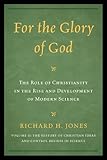For the glory of God : the role of Christianity in the rise and development of modern science / Richard H. Jones.
Material type: TextPublisher: Lanham : University Press of America, ©2011-2012Description: 1 online resource (2 volumes)Content type:
TextPublisher: Lanham : University Press of America, ©2011-2012Description: 1 online resource (2 volumes)Content type: - 9780761858591
- 0761858598
- Role of Christianity in the rise and development of modern science
- 261.5/5 23
- BL245 .J66 2011eb
- online - EBSCO
| Item type | Current library | Call number | URL | Status | Notes | Barcode | |
|---|---|---|---|---|---|---|---|
 eBook
eBook
|
Biblioteca "Angelicum" Pont. Univ. S.Tommaso d'Aquino Nuvola online | online - EBSCO (Browse shelf(Opens below)) | Online access | Not for loan (Accesso limitato) | Accesso per gli utenti autorizzati / Access for authorized users | (ebsco)1057988 |
Browsing Biblioteca "Angelicum" Pont. Univ. S.Tommaso d'Aquino shelves, Shelving location: Nuvola online Close shelf browser (Hides shelf browser)
"Numerous books have been written by philosophers and scientists about how creationism and intelligent design are not part of science, but scholars have largely ignored two of the main historical and philosophical issues underlying the attack on science. First, conservative Christian scholars commonly claim that Christian theological doctrines are the source of modern science. To them, modern science is the stepchild of medieval Christian theology or early Protestant doctrines. They believe that without those theological beliefs as presuppositions, modern science could never have arisen and that Christianity, or at least theism, is the only possible source of these beliefs. They argue that even today, all scientists, whether they realize it or not, must be committed to these theistic or specifically Christian ideas in order to practice science. This "dependency" thesis has now become widely accepted, even outside conservative circles. For example, renowned scientists such as Edward O. Wilson and Paul Davies accept the historical part of this thesis as a given. Second, some conservative Christians argue that theology has the epistemic right to control the content of all scientific theories and indeed the very nature of science. To them, science unfettered from theological control cannot reveal the true nature of the universe, and so theology must control the content and methods of all science. In the words of the philosopher Alvin Plantinga, "Scripture can correct science." In For the Glory of God, Jones challenges both the Dependency Thesis and Control Beliefs. He presents the historical and philosophical case against the Dependency Thesis and examines why modern science arose in the West and not in another culture. Jones also explores the negative effects of Control Beliefs on science. Throughout this work, Jones systematically studies how past and present religious conservatives have dealt with the complex nature of science."--Publisher's website
Includes bibliographical references and indexes.
v. 1. The dependency thesis and control beliefs. Christianity and the rise of modern science. Do the roots of modern science lie in Christian doctrine? -- What was Christianity's conribution to the rise of modern science -- Religious ideas and control beleifs in science. The role of religious ideas in science and the nature of control beliefs -- "Science," "religion," and "science and religion."
v. 2. The history of Christian ideas and control beliefs in science. Natural philosophy and the physical sciences through the 17th century -- Physics, astronomy, and mathematics in the 18th and 19th centuries -- Quantum physics and cosmology in the 20th century and today -- Natural history, geology, and biology through the 19th century -- Creationism and intelligent design -- Theistic evolutionism -- The autonomy of science today.
Print version record.









